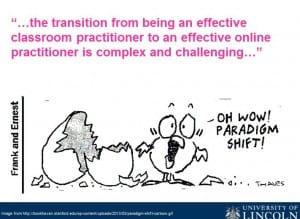Doug Peterson says ‘One of my first questions when I meet an educator is what’s the address of your blog?’ Doug’s JISC piece lists reasons for having an online presence. These include blogging for research, employability and simply yourself. One of the reasons I hear for not blogging is not having anything to say. Really? Nothing? Doug says there’s no such thing as a bad blog. Well, with respect, I disagree. There are plenty of blogs which are too long, too wordy and plain boring but I get his point. Better to blog badly and have an online presence rather than not at all. It’s about digital engagement. Social media are creating niche networks within higher education. Activities like blogging and tweeting emphasise divides between those who do and those who don’t. The gap is getting wider but it’s largely invisible. Like attracts like. If you do it’s with others who do. If you don’t you are less likely to be reading this in the first place.
This week I picked up from a tweet a piece in THES by Bob Harrison about making FE more of a digital experience. Here is the same old language of technology transformation. ‘Hopefully says Bob, ‘this time the transformative potential of technology for learning will be recognised rather than ignored’ People have been saying this since 1997 and the Dearing Report into the future of higher education. Today’s use of technology is mostly limited to uploading documents to a VLE. While this offers 24/7 access to information, the VLE can do so much more in terms of collaborative interaction. The problem is shifting from a repository approach to an activity one. Bob says we need ‘critically, refreshed workforce skills’, a ‘paradigm shift in how learning programmes are designed, delivered and assessed’ (cue favourite image!) and it’s ‘important to remember technology-enhanced blended learning is not a cheap option.’ We know all this. It’s the doing it which is the problem. The article linked to an Opinion piece in the TES about teaching digital literacy.
(This is the risk of social media – one thing leads to another and another until an hour is gone – does this make me digitally literate, a champion procrastinator or internet addict?)
Matt Dean says ‘FE needs to work out how to teach digital literacy.’ It was reminiscent of the 2007 blog post about technically illiterate teachers. The question for Matt is not should we teach digital literacy, but how to do teach it well. Good question but Matt is writing about students. The academic staff perspective is missing. HE have the same issues. I think we need to go back further and look at how teachers develop their own digital skills and identities in the first place. To see digital capabilities as ways of being and seeing as well as knowing which buttons to click. Digital divides are growing but for most institutions, access has become less of an issue than meaningful engagement. This is where help is needed. Rather than ‘teach digital literacy’ in isolation, it should be embedded in the curriculum to help ensure digital graduate attributes. In staff development and teacher education programmes to support staff trying out digital pedagogies and practices in safe supportive environments. We not only need to change what we do but change how we think and this is the challenge.
